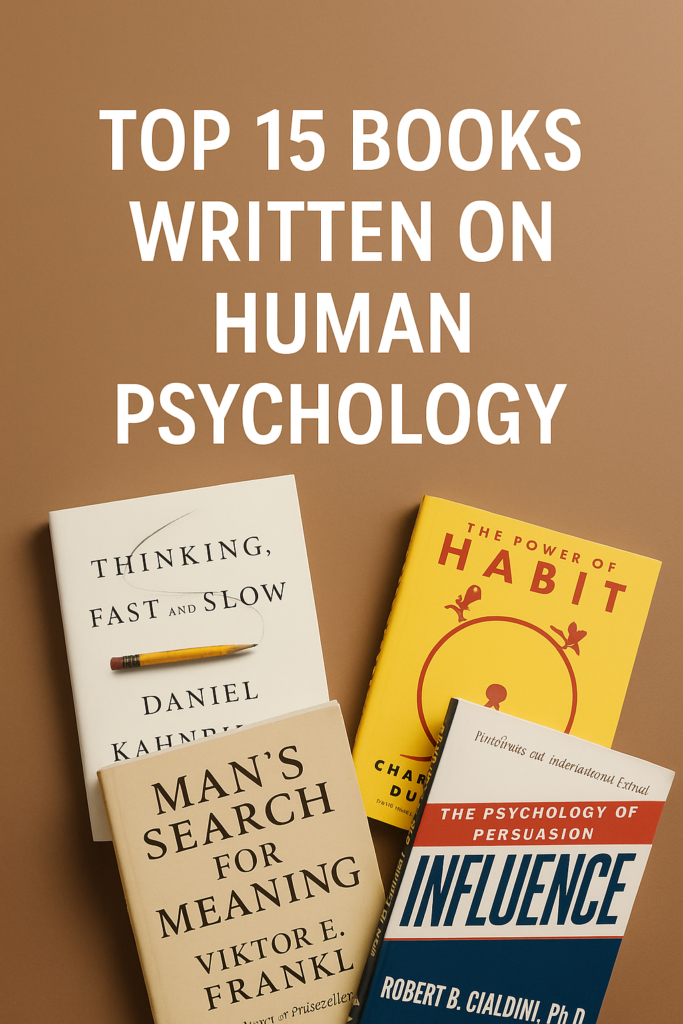
Psychology is the science of the human mind and behavior—how we think, feel, act, and evolve. Whether you’re a student of the discipline, a professional, or a curious reader interested in understanding yourself and others better, books on psychology offer profound insights into the intricacies of human nature.
In this blog post, we explore 15 of the most influential, readable, and thought-provoking books written on human psychology. These works span classic experiments, cognitive biases, emotional intelligence, personality theory, and the dark and bright sides of the psyche.
1. Thinking, Fast and Slow by Daniel Kahneman
This groundbreaking book by Nobel laureate Daniel Kahneman dissects how our minds operate using two systems—System 1 (fast, instinctive) and System 2 (slow, deliberative) thinking. A must-read for understanding cognitive biases, heuristics, and decision-making.
Best for: Fans of behavioral economics, critical thinking, and decision science.
2. Man’s Search for Meaning by Viktor E. Frankl
Psychiatrist Viktor Frankl chronicles his experiences in Nazi concentration camps and introduces logotherapy, a psychological approach focused on finding meaning in life. It’s both deeply moving and psychologically profound.
Best for: Those seeking purpose, resilience, and insight into existential psychology.
3. The Power of Habit by Charles Duhigg
Duhigg explains how habits work—cue, routine, reward—and how they shape our personal lives and societies. A practical yet deeply psychological look at how habits can be changed.
Best for: People interested in personal development and behavior change.
4. Influence: The Psychology of Persuasion by Robert B. Cialdini
This classic outlines the six key principles of persuasion: reciprocity, commitment, social proof, authority, liking, and scarcity. A must-read for marketers, psychologists, and anyone who wants to understand persuasion.
Best for: Those in sales, marketing, leadership, and communication.
5. Emotional Intelligence by Daniel Goleman
Goleman popularized the concept of EQ (Emotional Quotient) and argues that emotional intelligence often matters more than IQ. He explores self-awareness, empathy, motivation, and social skills.
Best for: Leaders, educators, and anyone looking to improve emotional competence.
6. The Body Keeps the Score by Bessel van der Kolk
This seminal work explores how trauma reshapes the body and brain, affecting mental and physical health. Van der Kolk offers groundbreaking insight into PTSD, neuroscience, and therapeutic practices.
Best for: Mental health professionals and those healing from trauma.
7. Drive: The Surprising Truth About What Motivates Us by Daniel H. Pink
Pink dives into the psychology of motivation, arguing that autonomy, mastery, and purpose drive human behavior more effectively than rewards and punishments.
Best for: Business professionals, educators, and creative thinkers.
8. Grit: The Power of Passion and Perseverance by Angela Duckworth
Duckworth presents “grit” as a critical predictor of success—more so than talent or intelligence. It’s a blend of passion and sustained persistence.
Best for: Students, athletes, entrepreneurs, and educators.
9. Stumbling on Happiness by Daniel Gilbert
Gilbert investigates why people are often wrong about what will make them happy. Combining psychology, neuroscience, and humor, this book reshapes how we understand happiness.
Best for: Readers exploring positive psychology and decision-making.
10. Flow: The Psychology of Optimal Experience by Mihaly Csikszentmihalyi
Csikszentmihalyi introduces the concept of “flow”—a mental state of complete absorption in an activity. He explains how to achieve it and why it’s vital for happiness.
Best for: Creatives, athletes, and professionals seeking deep focus.
11. Attached by Amir Levine and Rachel Heller
This book introduces attachment theory in the context of adult romantic relationships. It breaks down three styles—anxious, avoidant, and secure—and how they impact connection and conflict.
Best for: Couples, therapists, and anyone interested in relationship dynamics.
12. The Psychopath Test by Jon Ronson
Ronson explores the world of psychopaths—from criminal minds to corporate climbers. It’s part investigative journalism, part psychological exploration, and entirely captivating.
Best for: Readers intrigued by abnormal psychology and true crime.
13. Games People Play by Eric Berne
A classic introduction to Transactional Analysis, Berne explains the “games” people unconsciously play in their relationships and social lives. It’s both humorous and revealing.
Best for: Readers interested in personality, communication, and psychoanalysis.
14. Quiet: The Power of Introverts in a World That Can’t Stop Talking by Susan Cain
Cain argues that society undervalues introverts and shows how they bring deep value in leadership, creativity, and relationships. It’s a compelling mix of science, storytelling, and social commentary.
Best for: Introverts, educators, and leaders.
15. Mindset: The New Psychology of Success by Carol S. Dweck
Dweck’s research introduces the concept of fixed vs. growth mindset—a transformative idea in education, performance, and self-perception. Changing your mindset can change your life.
Best for: Teachers, parents, athletes, and self-improvement seekers.
Final Thoughts
These 15 psychology books offer diverse perspectives—from behavioral science to emotional healing, personal growth, and social influence. Whether you’re trying to understand others or decode your own mind, these books serve as invaluable guides.
Have a favorite psychology book that’s not on the list? Drop it in the comments—we’d love to hear your thoughts!